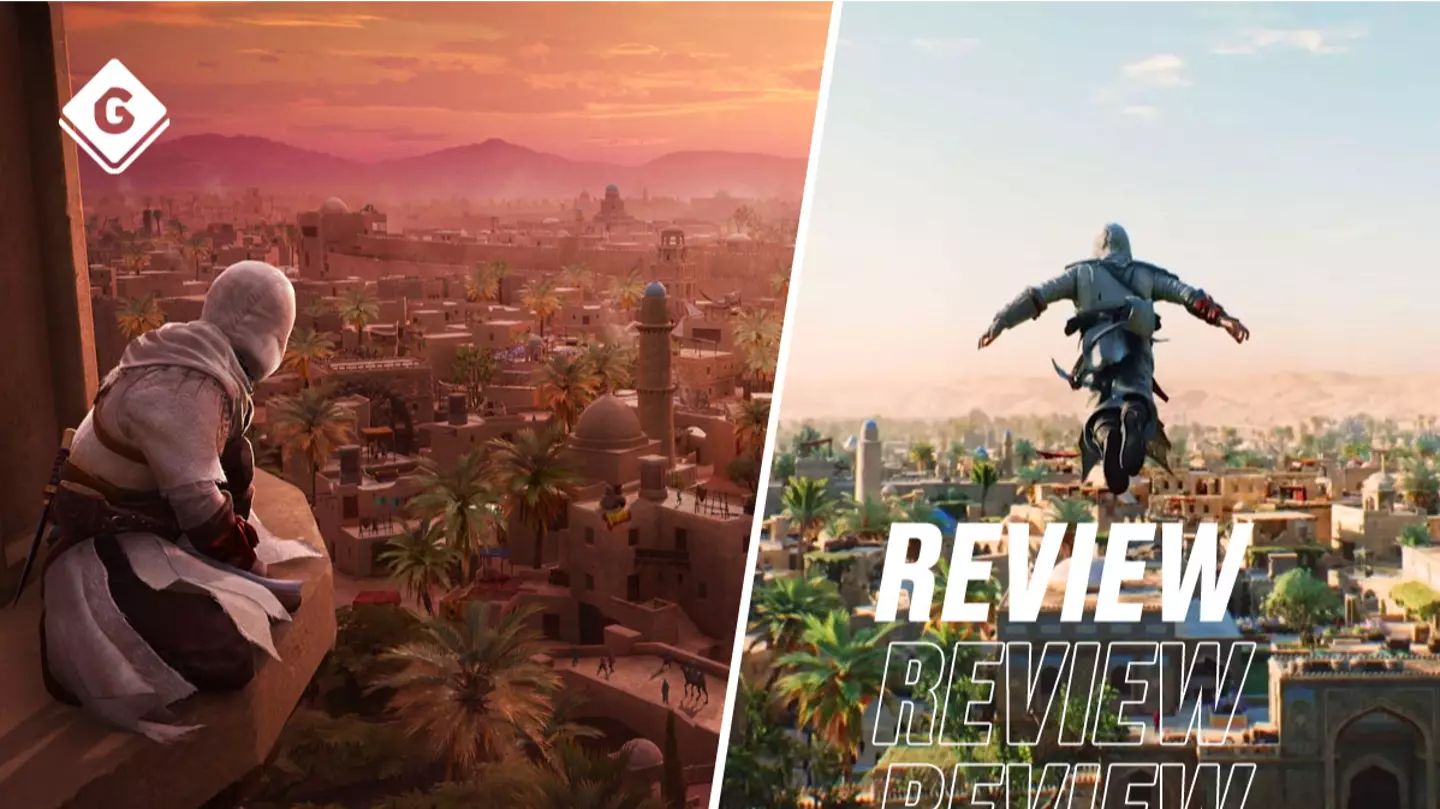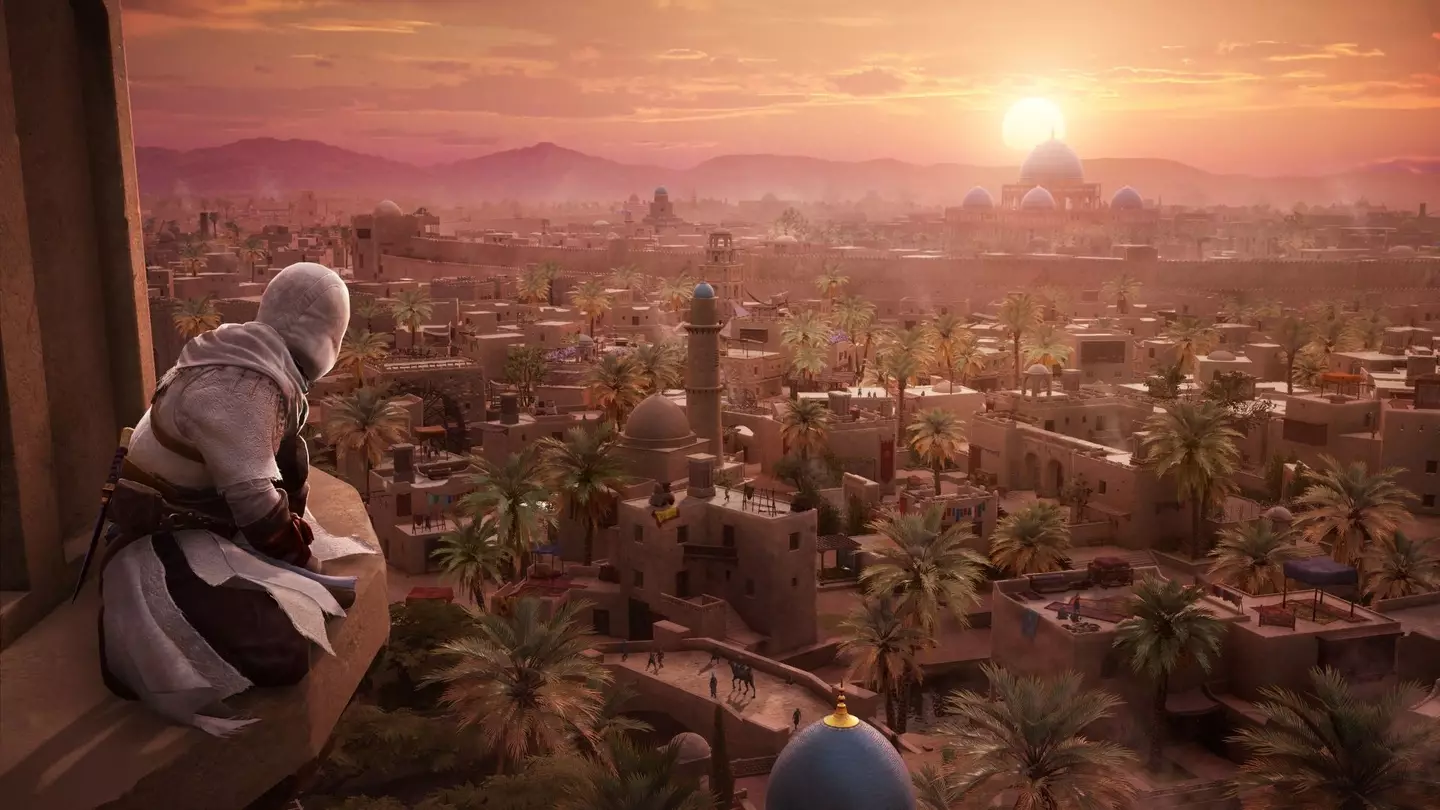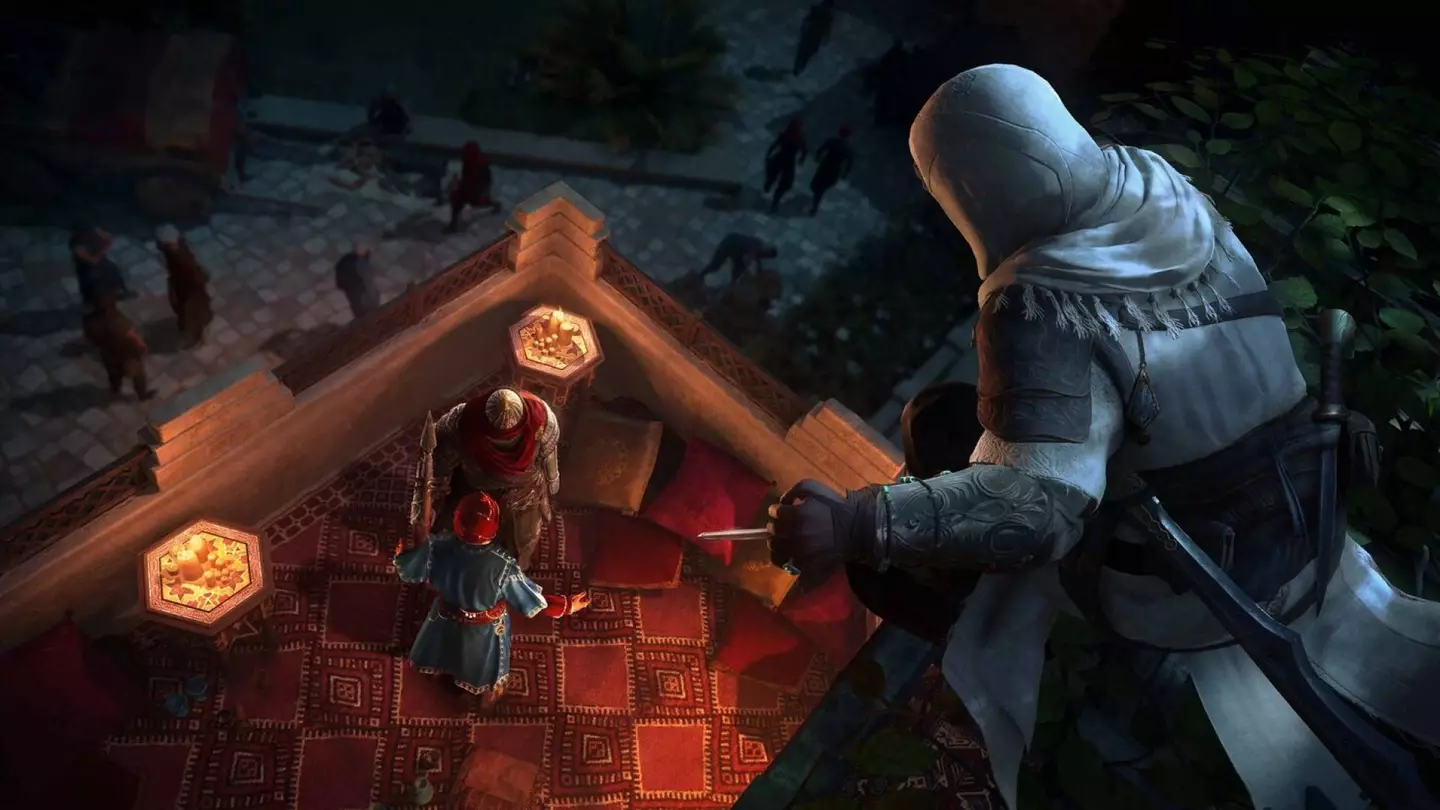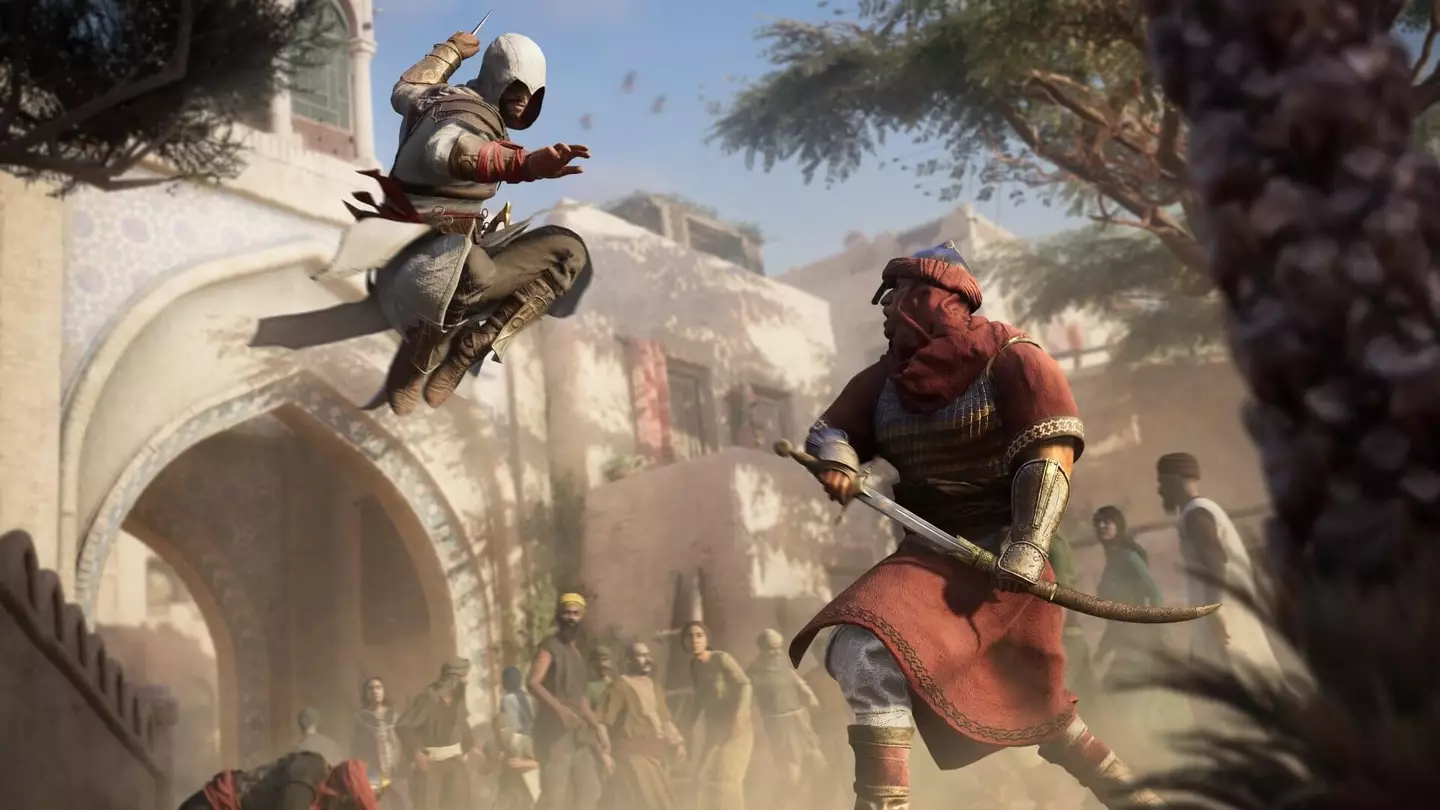
Assassin’s Creed Mirage is on the horizon, transporting players to the gorgeous city of Baghdad on a new adventure that promises to return the series to its roots of stealth and espionage.
As a fan of the series, with my all-time favourite being Assassin’s Creed IV: Black Flag, I was certainly curious to hear Ubisoft would be reverting back to the core values of the series, especially after going all-in with the RPG games.
Check out the gameplay walkthrough for Assassin's Creed Mirage below!
While I enjoyed the likes of Assassin’s Creed Odyssey and Valhalla, it's abundantly clear that they're a very different animal to the mainline titles, most notably the Ezio trilogy, which is still everyone's favourite.
Advert
With that in mind, I went in with high hopes that Mirage would be the return to form fans had been waiting for, and after rolling the credits, I can't say I was disappointed.
Assassin’s Creed Mirage follows Basim Ibn Ishaq, who actually appeared in a previous game, Assassin’s Creed Valhalla, though I won’t spoil how or why he’s there.
Basim is a skilled and talented street thief, but is plagued by nightmares of a mysterious creature that strikes fear into his heart. He longs for more in life, is absolutely fascinated by the existence and activities of The Hidden Ones (Order of Assassins), and wishes to join their ranks.
After an unfortunate turn of events, his wish finally comes true at a grave cost, propelling him down a path of vengeance and self-discovery as he rises through the ranks of The Hidden Ones and becomes more than just a man.

His mission is to dismantle and execute the Order Of The Ancients, the early historical version of The Templars, who are once again searching for ancient technology to control the world. Each sequence is essentially an investigation, where you help out the locals, look into the activities of societal figures and determine if they're helping the Order Of Ancients, or are a core member.
Advert
This then leads to a climatic assassination mission where you kill one of the Order's most valued members, before finally unmasking, and executing, the head of the snake.
The missions leading up to these encounters were pretty good, as most would give you plenty of options on how to infiltrate an area, and how to bring your target out into the open for a takedown. My only gripe was the variety, as most investigations would simply have me break into somewhere, read some notes or eavesdrop on a conversation and suddenly decide the target was evil and needed to die. I feel like it would have been better if it showed me how they were evil rather than telling me, so I could get a good idea as to what impact they were having on Baghdad and be better motivated to take them down, only to then see how my actions made a difference in the world.
I was thoroughly invested in Basim’s story from start to finish, and while my favourite Assassin’s Creed protagonist will always be Edward Kenway, I can safely say Basim is an extremely close second. I was just as intrigued as he was about learning more about the assassins, the creature that haunts his dreams, and ultimately, the secret regarding his existence, and when the story was finished, I was more than satisfied with what I’d learnt and its impact on the world.
Speaking of the world, Assassin’s Creed Mirage thankfully boasts a significantly smaller map than the last few entries. There’s still a decent amount of ground to cover, but it won’t take you nearly as long if you’re travelling by foot or riding a mount.
Advert
Baghdad is a beautiful setting, and while I played in Performance mode for the majority of my playthrough, the scenery still managed to take my breath away, even more so when I switched to the Graphics mode. The sunlight beautifully reflected off the buildings and rivers, and the way it would break through the gaps between buildings to light up some of the more shaded areas was delightful to look at.
Nightfall was even better, with the streets gorgeously illuminated by lamplight, set under a sky dotted with stars. You could change the time of day at will by sitting on a bench and passing time, which I’d do to either enhance the immersion during stealth missions or just because I felt like it.

Baghdad itself is split into several areas, which you’ll gradually find yourself in as the game’s plot advances. You’ll be crossing desert land to get there though, so while you could walk, you’d be better off on a mount. There are only two to choose from, a horse which you can customise and summon whenever you want, or camels, which tend to be near the entrances to the towns. You can either ride them manually or have them automatically follow the road they are on, or even have them take you to whatever quest objective/map marker you currently have selected, giving you a better chance to take in the sights as you travel.
Advert
But Assassin’s Creed is all about the parkour, and while I’d love to outline everything I loved about it, I unfortunately have to admit that it’s still the barebones mechanic it's been for the last few years. You simply hold down a button, move in a direction and Basim will do the rest, though can somewhat speed up the climbing by tapping the button a few times. The monotony of parkour is occasionally broken up by the odd zipline or pole vault, but ultimately it’s the same old traversal we’ve seen for just about every entry.
While the simplistic parkour isn’t the worst thing in the world, as it does keep the game accessible to the majority of players, it was a bit disappointing to see a game that prides itself on returning to the roots of the series to not spice up the freerunning just a little bit.
This was made even more frustrating because the simplistic parkour didn’t even work as intended. The game predicts where you want to go based on where you’re looking and the angle you’re running from, and while it was spot on for the majority of my playthrough, there were plenty of times when it’d mistake me wanting to slide over a table, for wanting to climb the stall roof that rested above it.
If I was exploring the city these mess-ups didn’t really bother me, but when my escape from the guards ground to a halt because Basim chose to hang from a ledge rather than climb it, it became frustrating very quickly.
Advert
Modern Assassin’s Creed games have the potential for revolutionary parkour mechanics, unfortunately, that potential is hindered by fear of overcomplicating the experience, when in reality some experimentation with the traversal could be exactly what the series needs.
Moving on though, if parkour is the bread of the Assassin’s Creed series, stealth is absolutely the butter, and it’s back in full force for Mirage.

Nearly every encounter gives you a choice of being a ghost, a predator or a brawler. There were plenty of times where I’d complete a mission by not killing a single enemy, or killing all of them by picking them off one by one. This was largely due to the skills and gadgets at your disposal, with the latter being great additions to the game’s sandbox.
Typical Assassin’s Creed tactics are viable, like hiding in foliage, whistling for a guard’s attention, and pulling them in for an assassination before stashing the body out of sight. The same goes for air assassinations, corner assassinations, or hiding in piles of hay/behind curtains. You've also still got Eagle Vision and your pet bird Enkidu to scope out the area you're infiltrating.
It’s given flavour by the unlockable skills and gadgets, and while some were definitely more useful than others, they all had a part to play in how I cleared out an area of hostiles, and I’ll give you a few examples.
If you spot two guards chatting, you’re faced with a problem. You can’t double assassination like in previous games, and whistling for one to come over will usually draw both of their attention, so one will almost always see you take down the other. What you can do is get above them, chuck a throwing knife at one’s head for an easy kill, and then immediately go for an air assassination before the other sounds the alarm.
If there’s a group of enemies, and you can’t effectively take them all down quietly because they're out in the open, you could throw a noisemaker and draw their attention long enough to sneak past, or throw a smoke bomb in the middle, take out one or two while they’re dazed, then run to safety before the smoke clears.
For other group encounters, you can eventually unlock the Chain Assassination, which lets you mark a certain number of enemies whom Basim will automatically kill in a weird Animus glitch animation. It depletes a Focus bar which needs to be recharged before you can do it again, which somewhat balances how trivial it makes certain encounters, though I tried to use it as little as possible simply because it felt like a cheap win.
In essence, you have options, and if the plan goes catastrophically wrong, you can either flee and come back when the heat has dissipated, or fight for your life with the game’s combat. It’s exactly the same as the previous games, with light and heavy attacks being your main method of attacking, though you can still use gadgets, as well as a parry and dodge mechanic to give yourself some breathing room/time for a counterattack.
If you do find yourself exposed, intentional or not, you'll activate the game's notoriety system. There are three tiers, with early tiers making guards suspicious of you, and higher tiers making them instantly recognise you, with the aim to kill you on sight.
What I loved most about the system was how it affected the denizens of Baghdad. The streets are littered with wanted posters that bear your face and outfit, and as your notoriety rises, the general public will recognise you more. If you hang around long enough for them to notice you, or if you accidentally barge into them, they'll panic and call for the nearest guards to kill you, so you want to take down as many posters as you can to keep your wanted level down.
I loved this, as it made the world feel that little bit more alive, as if a potentially dangerous criminal hopped onto your balcony, you'd probably call for the authorities as well.

The last thing I wanted to touch on is character progress. While Assassin’s Creed Mirage has mostly moved away from the RPG mechanics, upgradeable gear and outfits seem like they're here to stay.
All of your gadgets are upgradeable, meaning you can increase their damage, area of effect, how many you can carry, etc. Your weapons and clothing can be upgraded too, with each upgrade improving whatever effect it has. For example, Basim's default outfit makes assassinations quieter, so upgrading it reduces the noise they make even more.
You can also rack up and spend skill points to unlock personal upgrades and new abilities, like the aforementioned chain assassination. These range from combat abilities like a stronger counter move, reconnaissance improvements like a larger radius for Eagle Vision and personal upgrades like allowing Basim to carry more healing items.
It was fun to pick and choose the upgrades and abilities that I felt like I'd actually use in my playthrough, and it encouraged experimentation with the weapons and clothing I equipped in between missions or combat encounters.
Ultimately, I think Assassin’s Creed Mirage is a glorious return to form for the series, and I had a joyous time playing through it. It’s great to see the series shift its focus back to stealth and a compelling narrative about the Order of Assassins, and I sincerely hope Ubisoft treat Mirage as the new baseline going forward, whilst still evolving the series further. The main problem is still the parkour, as it’s just too simplistic, and often feels like the game is playing itself when all you’re doing is holding a button down, which is a shame because Baghdad was a lovely playground to explore.
Regardless, I thoroughly enjoyed my time with the game, and will definitely be heading back to Baghdad to find all the collectables and secrets hidden in its streets and shadows.
For all of you who fell out of love with the Assassin’s Creed series during the RPG games, I'd urge you to take a leap of faith with Assassin’s Creed Mirage, I don't think you'll be disappointed.
Pros: Solid narrative and protagonist, gorgeous open world, perfect return to more stealth-orientated gameplay.
Cons: Parkour is largely unchanged and simplistic, assassination missions, while fun, didn’t feel impactful.
For fans of: Assassin’s Creed
8/10: Excellent
Assassin’s Creed Mirage will launch 5 October for PC, PlayStation 4, PlayStation 5, Xbox One and Xbox Series X|S (version tested) Review code provided by Ubisoft. Read a guide to our review scores here.
Featured Image Credit: UbisoftTopics: Assassins Creed, Ubisoft